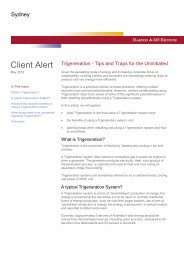The International Negotiations Handbook - Baker & McKenzie
The International Negotiations Handbook - Baker & McKenzie
The International Negotiations Handbook - Baker & McKenzie
Create successful ePaper yourself
Turn your PDF publications into a flip-book with our unique Google optimized e-Paper software.
PILPG and <strong>Baker</strong> & <strong>McKenzie</strong><br />
Defining “Success”<br />
In a dispute, it is important to decide in the beginning what the delegation is trying<br />
to achieve. From that, everything else follows. Every step and strategic choice in<br />
the negotiation process must be made after asking the fundamental question: how<br />
does this help your delegation “achieve success?”<br />
• <strong>The</strong> delegation must ask: what is your delegation trying to achieve? 1<br />
– Sometimes, this might be what is your delegation trying to avoid?<br />
• What does your delegation need?<br />
– Decide if it is complete victory, partial victory, or any progress at all.<br />
• What are the needs and goals of your delegation’s constituency? Your delegation<br />
will need to account for these factors in order to achieve success.<br />
• Evaluate the likelihood of achieving what your delegation wants, which requires<br />
evaluating the strengths of the other parties’ positions.<br />
• Decide whether your delegation is seeking a solution for now or a solution for<br />
all time (ceasefire, return of refugees, redrawing borders, sovereignty).<br />
• Break out the elements of your delegation’s ultimate goals – what “successes”<br />
are necessary to reach your delegation’s ultimate goals?<br />
Based on the points above – should your delegation redefine success? Once your<br />
delegation asks itself these questions, your delegation’s next obligation will be to<br />
decide whether what your delegation thought initially would be considered “success”<br />
remains the same. Oftentimes the discipline of going through the above exercise of<br />
examining and writing down your delegation’s answers to these questions reveals<br />
the strengths and weaknesses of your delegation’s initial definition of success. As<br />
with all internal communications, confidentiality must be maintained. Measures<br />
should be taken to ensure that the documents are not disclosed to the other parties,<br />
the media or your constituents by mistake.<br />
<strong>The</strong> chosen definition of success will drive your delegation’s strategy throughout<br />
the process. One of the challenges of a negotiation is deciding how strictly to<br />
____________________<br />
1 It is often helpful to write down the delegation’s responses to these questions and to refer to them<br />
throughout the negotiation.<br />
6

















